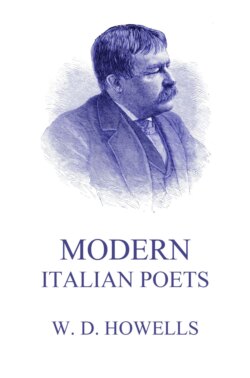Читать книгу Modern Italian Poets - William Dean Howells - Страница 11
На сайте Литреса книга снята с продажи.
III
ОглавлениеSignor Torelli is less severe than Emiliani-Giudici upon the founders of the Arcadia, and thinks they may have had intentions quite different from the academical follies that resulted; while Leigh Hunt, who has some account of the Arcadia in his charming essay on the Sonnet, feels none of the national shame of the Italian critics, and is able to write of it with perfect gayety. He finds a reason for its amazing success in the childlike traits of Italian character; and, reminding his readers that the Arcadia was established in 1690, declares that what the Englishmen of William and Mary's reign would have received with shouts of laughter, and the French under Louis XIV, would have corrupted and made perilous to decency, “was so mixed up with better things in these imaginative and, strange as it may seem, most unaffected people, the Italians,—for such they are,—that, far from disgusting a nation accustomed to romantic impulses and to the singing of poetry in their streets and gondolas, their gravest and most distinguished men and, in many instances, women, too, ran childlike into the delusion. The best of their poets”, the sweet-tongued Filicaja among others, “accepted farms in Arcadia forthwith; ... and so little transitory did the fashion turn out to be, that not only was Crescimbeni its active officer for eight-and-thirty years, but the society, to whatever state of insignificance it may have been reduced, exists at the present moment”.
Leigh Hunt names among Englishmen who were made Shepherds of Arcadia, Mathias, author of the “Pursuits of Literature”, and Joseph Cowper, “who wrote the Memoirs of Tassoni and an historical memoir of Italian tragedy”, Haly, and Mrs. Thrale, as well as those poor Delia Cruscans whom bloody-minded Gifford champed between his tusked jaws in his now forgotten satires. Pope Pius VII. gave the Arcadians a suite of apartments in the Vatican; but I dare say the wicked tyranny now existing at Rome has deprived the harmless swains of this shelter, if indeed they had not been turned out before Victor Emmanuel came.
In the chapter on the Arcadia, with which Vernon Lee opens her admirable Studies of the Eighteenth Century in Italy, she tells us of several visits which she recently paid to the Bosco Parrasio, long the chief fold of the Academy. She found it with difficulty on the road to the Villa Pamphili, in a neighborhood wholly ignorant of Arcadia and of the relation of Bosco Parrasio to it. “The house, once the summer resort of Arcadian sonneteers, was now abandoned to a family of market-gardeners, who hung their hats and jackets on the marble heads of improvvisatori and crowned poetesses, and threw their beans, maize, and garden-tools into the corners of the desolate reception-rooms, from whose mildewed walls looked down a host of celebrities—brocaded doges, powdered princesses, and scarlet-robed cardinals, simpering drearily in their desolation,” and “sad, haggard poetesses in sea-green and sky-blue draperies, with lank, powdered locks and meager arms, holding lyres; fat, ill-shaven priests in white bands and mop-wigs; sonneteering ladies, sweet and vapid in dove-colored stomachers and embroidered sleeves; jolly extemporary poets, flaunting in many-colored waistcoats and gorgeous shawls.”
But whatever the material adversity of Arcadia, it still continues to reward ascertained merit by grants of pasturage out of its ideal domains. Indeed, it is but a few years since our own Longfellow, on a visit to Rome, was waited upon by the secretary of the Arch-Flock, and presented, after due ceremonies and the reading of a floral and herbaceous sonnet, with a parchment bestowing upon him some very magnificent possessions in that extraordinary dreamland. In telling me of this he tried to recall his Arcadian name, but could only remember that it was “Olympico something.”
